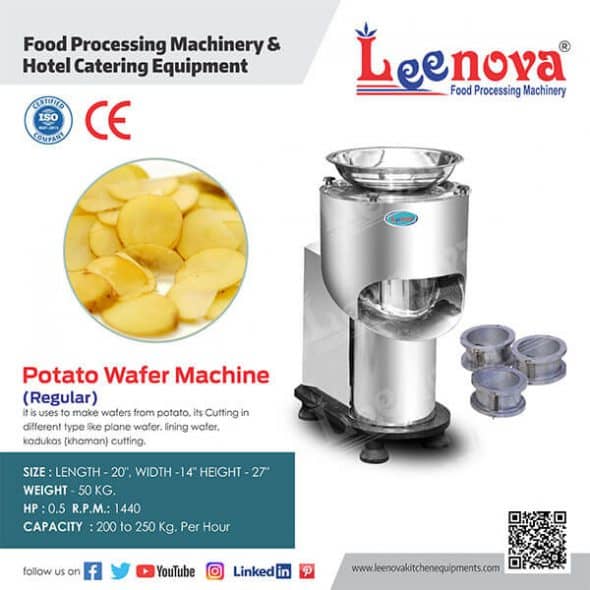The food processing industry uses specialized equipment called a chips making machine, also known as a potato chips machine or a potato chips production line, to manufacture potato chips or crisps. The machine automates the process of transforming raw potatoes into crispy and delicious chips, ensuring consistent quality, efficiency, and productivity. Visit: Potato Chips Making Machine
Here is an overview of the key components and functions of a typical chips making machine:
Raw Potato Handling
The process begins with the feeding of raw potatoes into the machine. Some machines may have an automatic feeding system or require the manual loading of potatoes into a hopper.
Washing and Peeling
The potatoes go through a washing and peeling process to remove dirt, debris, and skin. This is typically done using water jets and rotating brushes or abrasive rollers to ensure thorough cleaning and peeling. Explore: Hand Operated Salad Cutter Machine
Slicing and Cutting
First, peel the potatoes and then slice them into thin, uniform slices or cut them into desired chip shapes using slicing blades or specialized cutting systems like rotary slicers or mechanical cutters.
Blanching
The sliced potatoes are subjected to a blanching process, which involves briefly immersing them in hot water or steam. Blanching helps remove excess starch and pre-cooks the potato slices, ensuring a crispy texture and enhancing the final chip’s colour.
Dehydration
The potato slices pass through a centrifugal system or a hot air dryer to remove excess moisture after blanching. This step is crucial to achieving crispy and shelf-stable chips.
Frying
The dehydrated potato slices are then fried in oil at specific temperatures and for a precise duration. This frying process gives the chips their characteristic golden colour, crispy texture, and savoury taste. The frying equipment can include continuous fryers or batch fryers, depending on the production scale and requirements.
Seasoning and Flavouring
The seasoning drum or flavouring system adds various seasonings, spices, and flavors to enhance the taste and create different chip varieties after frying the chips.
Packaging
Finally, the packaging unit directs the chips, weighs them, fills bags or containers, and seals them. Packaging can be manual or automated, depending on the production capacity and packaging requirements.
Chips making machines can incorporate additional features and components, including oil filtration systems, temperature control mechanisms, quality inspection systems, and automation interfaces for monitoring and controlling the production process.
Overall, a chips making machine streamlines the production of potato chips, ensuring consistency in size, shape, texture, and flavour. These machines significantly increase productivity, reduce labour-intensive tasks, and maintain high-quality standards in the production of chips. The snack food industry, catering services, and food processing facilities widely use them to meet the growing demand for crispy and tasty potato chips.
Read About: Overview of Biomass Briquette
